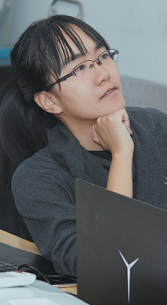Cluster of stars
A group of skilled students helps Tsinghua University to retain its crown at major supercomputing competition despite the challenging change in format, Li Yingxue reports.


Taking up tasks
The teams had to complete a number of tasks, including Linpack-or linear software package-benchmarks.
Linpack is basically using the computer to solve a linear equation with one million unknowns, Han says. Because many practical problems can be converted into this equation, so it is fundamental function that needs to be tested.
Han explains that the teams are scored on the speed at which they complete the task.
Another challenge was the Gromacs molecular dynamics application-something that is relevant to the COVID-19 pandemic. Molecular dynamics simulations offer accurate approximations of real molecular behavior, which is useful in different stages of drug development.
Song Zeyu was a member of the Tsinghua University team, who together with another teammate, was tasked with running that application.
The 20-year-old spent the first day learning about the topic and started to run the application on the second day of the competition. He and his teammate took turns to sleep so that one of them was always monitoring the application.
"When the competition was held on-site, we got the chance to talk with the other teams, which was a great experience," recalls Zhang Chen, who joined Tsinghua's supercomputing team in 2018.
For the 2020 competition, Zhang was the team leader.
"Obviously, I have much more responsibility. I need to keep an eye on the progress of all the team members during the competition and make final decisions and some tough choices, including how to assign our resources and budget," says the 21-year-old.
During the competition, she would regularly gather the team together to discuss budgetary constraints and how to best distribute the resources.
"The budget is definitely not enough to finish running all of the application challenges, so we needed to decide how to assign the money," she says.
Zhang recalls on the second night, she needed to make the first big decision of the contest when they realized that a majority of their budget would have to be spent on just one of the challenges.
"On the third night, when we needed to decide how to use the extra $500 suddenly given to us, we shut down all devices to discuss it, which was a tense moment for us," Zhang recalls.
Zhang didn't get much sleep during the 72-hour competition-as the event wore on, her nights became more restless.
It was not in vain, though, as the team didn't only end up winning the whole thing, but also achieved the highest score in Linpack benchmark.




































